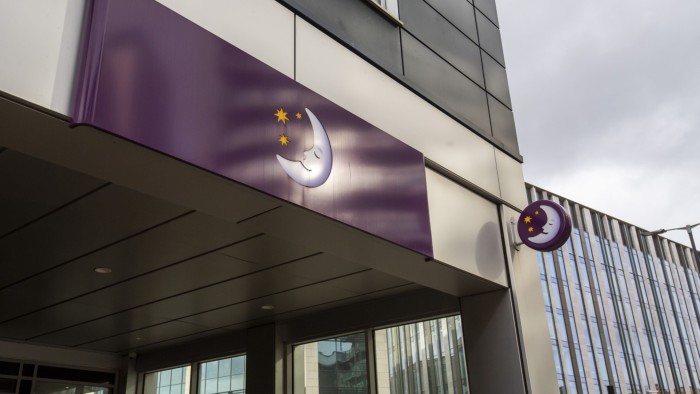Unlock the Editor’s Digest for free
Roula Khalaf, Editor of the FT, selects her favourite stories in this weekly newsletter.
If Taylor Swift’s performances are said to boost whole economies, can Britpop returnees Oasis do the same this summer for UK hoteliers? Asking for Whitbread, owner of the Premier Inn chain.
Whitbread’s shares are up roughly 10 per cent since the beginning of April, compared with a flat performance for the FTSE 100 and for bigger blue-chip rival InterContinental Hotels Group. In its full-year financials released last week, softening profit was balanced against strong room bookings and a £250mn share buyback.
Crediting the Gallagher brothers’ reunion for a recent rally in its shares is too much, but their tour is a handy starting point for considering what might sustain the group’s gains. The case against Whitbread is that hotels are one of the most cyclical industries and the UK economy is softening. Cost-conscious consumers travel less.
Premier Inn, though, is at the budget end of the market. Its hotels are not vacation destinations, but where, say, wedding guests stay after blanching at the cost of the happy couple’s pricey venue. Business travel is in fact growing, the company says, as managers look for more budget-friendly options. Big sports fixtures and big concerts such as Oasis are other reliable room-fillers.
Analysts at Citigroup estimate 1.5mn fans will attend Oasis’s 15 sold-out UK gigs, compared with the 1.3mn Swifties who turned out for the Eras Tour’s UK dates last year. If half stay in hotels, sharing rooms, the Citi analysts reckon that’s a hefty 3 per cent of the entire UK room supply on concert days. Reports abound of hotels near gigs hastily raising prices, though Premier Inn’s prices are capped.
Even without Swift, Oasis or the economy improving, Whitbread believes it can meet its 2030 targets. That’s due to a mix of rising profits from its fast-growing German business, tight UK room supply helping at home, cost efficiencies such as a recent switch to robot vacuums and the financial flexibility from owning its hotels.
Its likely that Whitbread’s shares have benefited less from any champagne supernova or its operational resiliency than from the fact that, unusually among FTSE 100 companies, it has no US business. That insulates it somewhat from President Donald Trump’s uncertain trade policies.
Of course, nothing can entirely shield a hotelier from events outside its control. A sharper downturn would hit that business travel growth and leave even nostalgic music fans counting the pennies. For now, though, Whitbread is on the right side of the cultural and economic moment, and investors might as well roll with it.
